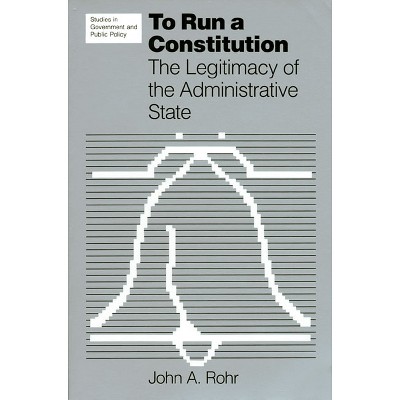Sponsored

The Power of Accountability - (Studies in Government and Public Policy) by Robin J Kempf (Hardcover)
In Stock
Sponsored
About this item
Highlights
- Migrant children separated from their parents.
- Author(s): Robin J Kempf
- 192 Pages
- Political Science, Public Affairs & Administration
- Series Name: Studies in Government and Public Policy
Description
About the Book
"Offices of Inspectors General (or OIGs), bureaucratic units dedicated to government accountability, are a relatively new phenomenon. Virtually none existed before 1976, but now two-thirds of the states and many localities have them. OIGs spread quickly with the passage in 1978 of the Inspector General Act. Today there are 73 offices in the federal government, which have received all of the scholarly attention. In addition, however, there are over 150 state and local OIGs, and 31 states have at least one office. These understudied OIGs were established originally on the model of the federal offices, but they have developed in distinct ways, often deviating from the norm because of different views about the powers such offices should hold. The Power of Accountability is the first study to shed light on these local OIGs. Using both quantitative and qualitative data, including theories of neo-institutionalism and policy diffusion, Robin Kempf-herself a former Inspector General of the Kansas Health Policy Authority-helps us understand why OIGs are spreading so rapidly, why they vary so substantially in their design, and what the implications of this variation are for state and local OIGs as a mechanism of accountability"--Book Synopsis
Migrant children separated from their parents.A scheme to defraud Cook County using property tax breaks.
An undisclosed thirty-year business relationship between city officials in Baltimore. These are the sorts of headlines regularly generated by offices of inspector general (OIGs)--bureaucratic units dedicated to government accountability that are commonly independent of the agencies they are charged with overseeing. In 1976, OIGs were virtually unheard of and were largely at the federal level, but today there are more than 170 OIGs overseeing state and local government entities. Why have OIGs been so widely adopted, and what do they do? How do they contribute to accountability, and what are their limitations? In The Power of Accountability Robin J. Kempf sets out to address these questions with empirical data and to examine the conflicts that have led to variations in the design and implementation of OIGs. In doing so she explores the power of the concept of the inspector general: an institutional model for keeping subnational government units accountable to the public. As more and more government entities have created offices of inspector general, practitioners in this developing field have recommended an archetypal structure for these agencies that assures their authority and independence. Why then, The Power of Accountability asks, have so many states and localities incorporated significant deviations from this recommended model in their design? Through an extensive review of government websites, laws, and ordinances; original surveys of the identified OIGs; legislative histories; and interviews with thirty-eight OIG staff in eight states, Kempf analyzes why OIGs have proliferated, why and how they work differently in various jurisdictions, and what effect these variations in design have on the effectiveness of OIGs as a mechanism of accountability. The ever-expanding call for accountability in government drives the increasing demand for offices of inspector general, which necessarily entails intense political maneuvering. The Power of Accountability is a uniquely useful resource for judging whether, under what circumstances, and how well OIGs fulfill their intended purpose and serve the public interest.
Review Quotes
"The book offers an important and compelling framework for understanding and improving the OIG model to support and enhance accountability at the state and local levels."--Political Science Quarterly
"Robin Kempf walks us step-by-step through the considerations involved in creating offices of inspectors general (OIGs) and in doing so provides us with a rich account--as ethnographic as it is statistically informed--of the institutionalization of one of our primary contemporary modes of public accountability. Using a rich variety of methods, she tells the story of how OIGs come into being and of why and how this model of institutional accountability has spread so widely across states. Her compelling account begs questions about the effectiveness of such models and will be a reference point for future scholars of accountability."--Nadia Hilliard, author of The Accountability State: US Federal Inspectors General and the Pursuit of Democratic Integrity
"The Power of Accountability is a valuable contribution to our knowledge and understanding of state and local inspectors general, accountability institutions that have been created and have evolved over the past four decades but have, until now, received little attention from researchers. Dr. Kempf has carefully studied the inspectors general concept and its conceptualization, design, and implementation at the state and local levels. Social scientists, students, legislators, administrators, and citizens concerned with governmental accountability will find The Power of Accountability informative, accessible, and useful."--Dan Ahern, Clarus Group

















